The Hour of Revelation
Sands idly wafted over dunes, the Luxa River flowed from one end of Naktamun to the other, families lived and worked in happy peace, and through a ripple of air, a dragon tore through the sky from a faraway world.
He had days. Only days until he wouldn't have the magic left to execute this plan. There was just enough time left to put into place the possible means to regain his godhood.
The dragon's plans spanned millennia and his perception straddled centuries, a winding maze of possibility and circumstance and statistics and likelihood. Usually the dragon played the odds when shaping his decisions—but now, to manifest his needs, the dragon would need to be violent in his choices.
Violence is an act that cannot be taken back or amended halfway through. It is begun, then ended. The dragon's choices must be the same. No doubt. No hesitation or uncertainty. Merely violence.
The gods of Amonkhet saw the dragon hovering outside the protection of the Hekma. They climbed to the tops of their highest vantage points and armed themselves for battle. They were determined not to fail this time. No monster could defeat the eight gods of Amonkhet. Not when Naktamun was all that remained.
Oketra raised her bow high, and the light of twin suns glinted off its curve. She loosed an arrow into the sky, and it passed through the Hekma with ease. The arrow hit the dragon's side, and he laughed. The great dragon flew down toward the shimmering dome of the Hekma and tested it with a tentative claw. Oketra loosed another arrow, this time aimed directly at the dragon's eye. The beast glanced at the incoming projectile; it splintered and dissolved mid-flight.
The gods were stunned. This dragon possessed enough power to defy the laws of nature.
Hazoret called for the children and elderly to retreat to the mausoleums for safety, and the attendants spread the word. She took up her spear and urged the gods to attack.
The gods' distraction to protect the mortals amused the dragon. These gods cared far more about their plane than he ever did about the worlds he created.
Kefnet, caretaker of the Hekma, was straining to keep the magical barrier together. The dragon tipped his chin and fractured Kefnet's mind in two.
Kefnet's body and wings went limp and he plummeted to the ground, crumpled and still.
The hearts of the mortals in Naktamun recoiled in immediate pain. Even those who did not witness Kefnet's fall felt panic. The gods in turn cried out for their brother, and for the loss that swept through the people of Amonkhet.
The dragon smiled. He extended a claw, and a pinprick of light broke through the blue of the barrier.
The gods brandished their weapons and snarled with defiance. No beast would harm an immortal without facing retribution.
The Hekma wavered. Its film waved as water in a river, and the hole widened enough for the dragon to burst through.
The dragon protected himself from the attacks of the other gods by separating himself a half-step from reality. The vision of his form remained, but his body was safe from their blows.
The gods of Amonkhet roared and cursed, but no blow from their weapons would land. The trespasser's power was at least equal to their own. The dragon landed atop the tallest tower, closed his eyes, and began to channel a spell.
The time for violent choices had come.
The gods felt a surge of mana weave around the dragon as a tangle of malevolence. They grasped desperately for spells to protect and defend.
But they were too slow.
The dragon opened his eyes and every mortal old enough to walk dissipated into the sky.
A brilliant white light engulfed Naktamun, and the seven gods fell to their knees in agony as countless souls vanished from existence.
The light retreated. Silence fell, only to be broken by the faraway cries of thousands of motherless, fatherless infants.
The gods cried out in horror. The infant prayers were without form in their minds. Endless pleas washed over them, waves of wordless fear and confusion, half-finished visions of mothers and fathers breaking apart, particle by particle. The sudden loss of life rendered the gods inert, paralyzed in shock, like losing a limb.
But two of the gods did not stay still. Hazoret pulled Oketra up from the ground with a quiet assertion. The two fled from the great dragon as he laid claim to their brethren. The dragon, bemused, followed at leisure, silent and unhurried.
Oketra ran alongside her sister and down into their most sacred mausoleum. As they ducked and entered the holy tomb, passing through row after row of enchanted dead mortals, the shrill sobs of orphans reached the gods' ears. Oketra sealed the door behind them, golden light binding the stone portal shut, and Hazoret began gently picking up as many children as she could. Oketra assisted, gathering the children and soothing them with her presence.
The dragon's laugh suddenly resounded through the mausoleum. Hazoret looked to Oketra as they heard and felt the dragon on the other side of the entrance, testing the barrier's strength. The dragon sensed the heartbeats of the surviving children behind the door, as well as thousands and thousands of enchanted dead, and he chuckled at the perfection of his plan. Slowly he unwound the god's magical seal, taking his time to revel in the despair on the other side of the stone.
The two gods set the babes in a small alcove within the chamber and stood side by side at the entrance to the sacred mausoleum. Hazoret readied her spear. Oketra drew her bow.
"The children of Naktamun will not die at the hands of a beast!" Hazoret cried.
"The children of Naktamun will die at the end of your spear," replied the dragon.
The dragon burst through the mausoleum door. Oketra and Hazoret charged. With a wave of a claw, the dragon sent forward a pulse of magic, and the minds of the two gods went utterly blank.
They fell where they stood.
The dragon, satisfied, continued his work.
The next step in the dragon's plan required self-sufficiency. A people who were willing to do the work themselves without the dragon's presence.
There were many options with many outcomes, but time was growing short—already a day was gone in the subsuming of the gods. The dragon chose the quick path.
Violent choices.
First, he returned to the surface and took three of the gods for his own. He stowed them away as one would tools in a cupboard. Their time would come soon enough. With his remaining power, the dragon corrupted and manipulated the leylines of mana that coursed through the remaining gods, willing them to forget their origins, tying their existence to himself, and forcing them to erase all else.
Second, he opened the tombs under the city and led the enchanted bodies of the dead out of their mausoleums and into the light. There were so many orphaned infants now, and the children would need caretakers.
Third, he drew on the histories of the plane. There existed an elite religious ceremony—trials of merit, with the result being a single sacrificial champion every revolution of the second sun. A rare cultural cornerstone revered by both man and god. Perfectly suited to repurpose for his designs. The dragon rejoiced at the convenience. What had occurred once every few decades would now demand a constant supply of champions. He spelled the second sun to move as he was ready, to count down until whenever he decided to return. This would be the cornerstone of his machinations on this world.
Fourth, the dragon built a throne inside the perimeter of the city. On the other side of the barrier, he erected a monument in his own visage, an homage to his magnificent horns, and enchanted it to appear stationary from every angle. He built the monument to frame the smaller sun on the horizon at the moment of his choosing. The dragon was proud. Vanity is survival when one is rapidly losing omnipotence.
Finally, he made a promise to return, delighting in the writing of his own prophecies, and planting his promise in the gods and the minds and mythos of the denizens below. Mortals adored promises. They saw them as unmovable as mountains, when in truth they were mercurial as rivers.
As the dragon departed, the small sun continued its slow journey across the sky.
From afar the dragon maintained, monitored, and moved his machinations on other worlds as the years fell away, urging the second sun slowly around its track
until this particular moment
in this particular place
on this particular plane
when that sun had rounded its circuit
and came to settle between the great horns as foretold.
As promised.
At last.
The time had come for the dragon to return to collect his hoard.
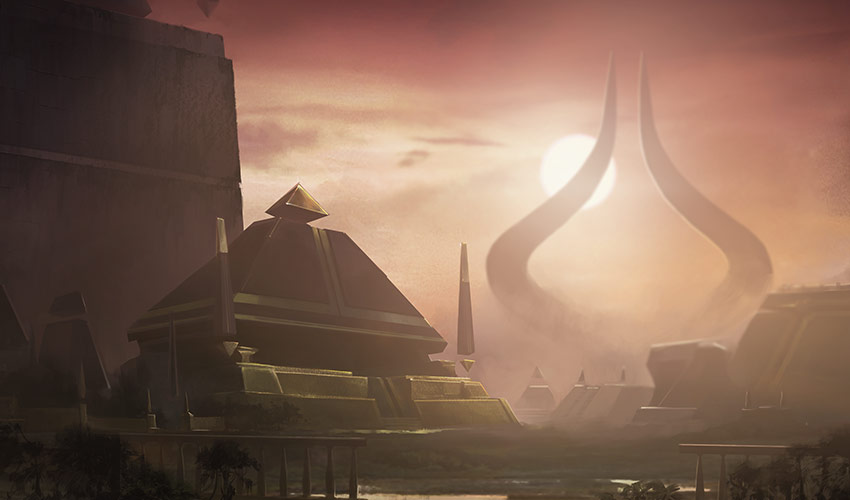
"And thus the sun reached its zenith behind the horns of the God-Pharaoh, and the promised Hours began. And the last of the people of Amonkhet fell to their knees, and there was much gnashing of teeth for fear of what was coming in the world, and wailing from babes and children, and the gods did mark the moment with solemnity, all as foretold."
Djeru ran as fast as his feet would carry him, eyes fixed on the second sun peeking from behind either side of the leftmost horn in the distance. It left the city in a lingering dusk, and the strangeness of the atmosphere only heightened the excitement and revelry of the citizens of Naktamun.
Samut ran alongside Djeru, gripping his shoulder tightly with one hand. As the two exited the arena, they were met with a stampede of citizens, all racing toward the banks of the Luxa River. It was a chaos Djeru had never seen before. Any semblance of commitment to one's own crop had been forgotten, queues and decorum abandoned in the passing from one age of existence to the next.
So few were left.
In the months leading up to the end of the second sun's cycle, more and more citizens arranged to take the Trials early and prove their worth. Schedules were rearranged. Crops became double the normal size. The result was a city even more empty than usual, populated mostly by the anointed and the youth too young to partake.
Djeru and Samut waded through the throngs of children too young to begin the Trials, bumping into their hips, tripping over their legs. The children's arms outstretched and faces warped with desperate, fervent tears. Their small feet moved fast. The anointed caretaker couldn't keep up, and most of their kind had resigned themselves to standing aside to let the stampede through.
A shadow passed over them—the legs of Hazoret—and the god stepped high over their heads as she made her way to the river. Throngs of children and those unable to take the Trials tugged at her sandals and leapt for her spear—Take me! Please, Giver of Gifts! Let me die before he comes so I may go along!—but the god ignored them, her eyes trained on the Luxa River and the Gate at the end.
The God-Pharaoh's approach was nigh. His homecoming would certainly take place at the Gate to the Afterlife, the massive stone barrier where the Luxa River met the shimmery blue of the Hekma. The Gate used to only open for the lucky few who passed the Trial of Zeal. But now, with the coming of the God-Pharaoh, his promise would be fulfilled.
The promise of the Hours.
New hope cascaded over Djeru. He was meant to be the final one to pass through the Gate, his glory was to be bestowed unto him by Hazoret, Giver of Gifts.
Until Samut ruined everything. Until the traitor, Gideon, intervened.
Yet Samut now stood at his side, a hand gripping Djeru's arm, her stance one of protection and shielding. Djeru's heart felt at ease with her familiar presence by his side once again, even as his mind still reeled at her betrayal.
She robbed me of my destiny for her selfish doubts, he thought.
But perhaps the God-Pharaoh would still grant them a place at his side nonetheless. Perhaps he could plead their case, and both prove their worth and show Samut the error of her ways.
Djeru whispered a prayer of hope, a little plea drowned out by the cries and yells of the crowd around them in the unfamiliar twilight.
"The Hours have begun!"
"Where is he?!"
"Deliver us, God-Pharaoh! Show us your grace!"
"Ow!" Samut cried out as a naga smashed past her in his rush toward the river.
"He force-fed us complacency for years and we greet him with this," she seethed under her breath. "It is lies and chaos."
Djeru didn't respond to Samut's continued heresy. A growing sound in the distance had drawn his attention.
Ambient noise. Endless creaking. Something dark and old, caused by something without form. The khenra nearby all clamped their ears and whined as they ran, the naga jumped as though the earth moved beneath them, and every being instinctively looked to the far end of the river.
Samut's grip on his arm tightened. "The Gate."
The two picked up their pace and approached the massive crowd that had gathered at the banks of the Luxa. The mass of citizens wailed in fear and boundless joy. A minotaur sobbed, two khenra twins had fallen to their knees in praise, and several children were attempting to ford the river and cross to the Gate.
It was a collective madness unlike any Djeru had ever witnessed. For a moment, fear gripped his heart. But the chaos was contagious, and the frenzy of the moment swept Djeru away. Although he was meant to be in the Afterlife by now, Samut's betrayal had given him the privilege of witnessing the God-Pharaoh's return. Perhaps all would work out after all!
Suddenly, as abruptly as it began, the noise stopped.
Djeru craned for a view, his sandals sinking into the soft mud of the riverbank. Warm water lapped at his toes as bodies pressed all around him, all stretching for a better look.
"Djeru, you need to promise me something." Samut's whisper was soft on Djeru's ear.
He didn't want to listen to her. But he also didn't want to let her go.
"No matter what happens, we protect our gods. We protect each other."
Djeru didn't know what she implied, but he silently nodded.
A collective gasp of surprise washed through the crowd.
In the distance, the light of the second sun spilled past the horn. It had finally passed behind the monument, and a line of brilliant light crossed from one side of Naktamun to the other. A cheer rang out from the crowd as the sun reached its final point, nestled between the faraway horns.
At that exact moment, with no warning, the Gate cracked open ever so slightly, the rough grit of its stone parting the current of the river.
No living person had ever seen what rested behind the Gate to the Afterlife. Only the dead crossed beyond the Gate, which opened to allow a funerary barge to pass once a day.
Even from where they stood, Samut and Djeru felt a hot wind blow through the crack in the Gate.
From behind him, Djeru felt a god approach. He watched as Hazoret waded into the river, carefully stepping over the heads of her people, avoiding them as she walked.
"He arrives!" she cried.
Djeru felt the glow of the god's joy seep into him, her exaltation reinforcing his own optimism.
A child next to them began crying as others shoved to get closer to the bank of the river.
Some aven flew up toward the Gate and tried to pry it open further. Other people waded into the water and swam toward the opening, though none seemed to reach it.
It was still impossible to see through the crack. Only a sliver of light betrayed the fact that it was open at all.
Samut gripped Djeru's shoulder and shook her head. "We shouldn't stay here. We should go—"
The hiss of wind coming from the Gate grew stronger, and in one swift motion, the doors opened wider. Samut's hand fell from Djeru's shoulder as they both stood transfixed, staring at the opening Gate.
The entire crowd went silent in awe.
The heat of the wind blasting through grew in intensity, peppering the crowd with grit and sand. They held their hands to their eyes to block the sting. The Gate swung all the way open, and the massive crowd gasped.
They had been promised paradise.
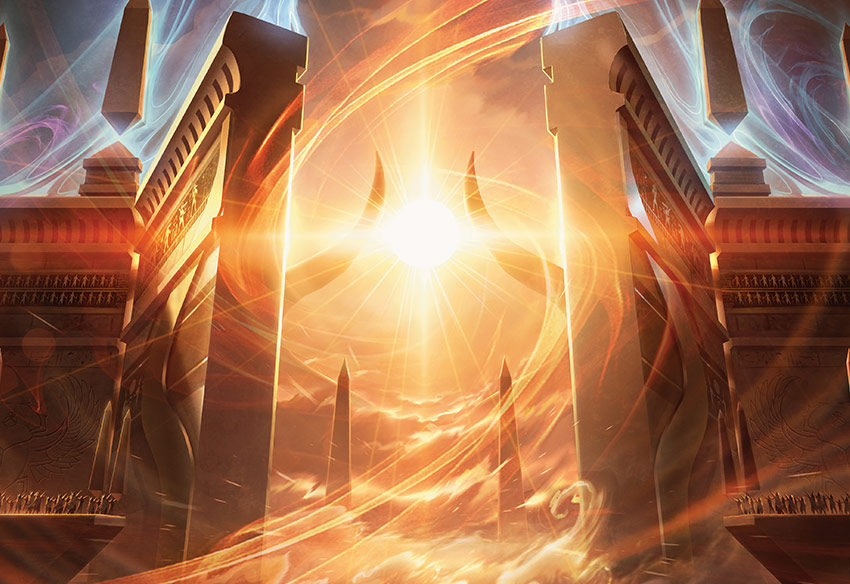
What lay beyond the Gate were endless, empty wastes.
Djeru's mouth hung open. There was supposed to be fields of green meadows! Natural springs and a bountiful ocean! And in its place . . . nothing. Desert. Beasts. Wurms and crocodiles and cursed bodies of heretics. The same thing that was on the Hekma on all its sides. Endless, eternal, all-encompassing and unforgiving nothing.
Djeru couldn't comprehend it.
Around him, the crowd erupted in confusion. Some cheered. Some yelled out words of praise. Others looked to their neighbors for answers. Was this paradise?
The concern passed in a wave from person to person, getting louder and louder by the moment.
Something massive crashed in the water. Hazoret moved her legs sharply through the current. She began to quiver, ears tightly held back flat against her head, but her arms outstretched in a display of welcoming.
Djeru pushed his way to the front, wading into the water behind Hazoret, trying to get a better look. The only thing he could see beyond the Gate was a building that could only be the Necropolis—the fabled place where the worthy dead were laid to rest, awaiting the return of the God-Pharaoh.
Djeru turned to Samut, but Samut's attention rested on the god before them.
"Hazoret!" Samut yelled. The god whipped her golden head down, her gaze directly on Samut.
"Is that paradise?"
Hazoret did not answer. Djeru watched her chest heave up and down with concerned breath, her face unreadable.
"Please, Hazoret, cast away my doubts and tell me that is paradise."
The god lifted her head ever so slightly, and still refused to answer.
The rest of the crowd began to argue.
There was still no sign of the God-Pharaoh. Was this a test? Was the absence of paradise supposed to mean something? Perhaps paradise will not become manifest until he arrives. Perhaps the place beyond the Gate isn't the endless waste it appears to be—perhaps this was paradise all along!
The cacophony of voices fell as a massive, dark, and winged figure flew through the open Gate and past them on the banks of the river. Denizens ducked, then looked up, trying to catch a glimpse of the fleeting shadow. Excited cries and hails calling to the God-Pharaoh rang out.
But Djeru knew that thing was no God-Pharaoh.
He watched its path as the thing landed resolutely on an obelisk, gazing down on the people below him. He heard Samut draw her khopeshes behind him, heard her hiss a word that tasted like a curse, spat vile and angry from her lips.
"Demon."
A shiver of dread danced down Djeru's back. Demons were rare on Amonkhet. Djeru had only seen them in texts and in his studies, and as fleeting, dark shapes far outside the Hekma. Such creatures had no place in Paradise—but Djeru knew the legends of this demon.
The final test; the last inglorious death before the God-Pharaoh's return.
The demon stood high atop the obelisk and spread its wings to catch the warmth of the second sun. Djeru could make out a crocodilian form and a mad smile. Endless scales ending in a thick tail. Sharp wings leading toward a sharper grin.
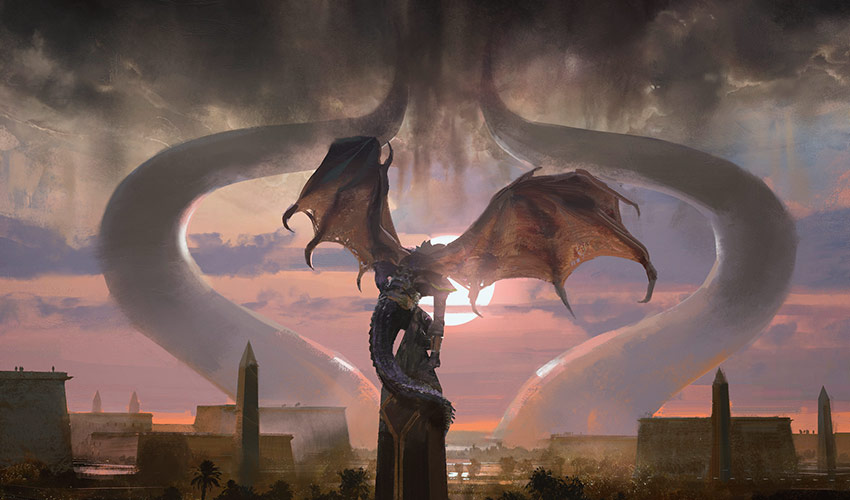
The demon surveyed the assembled denizens. Its lips curled into a sneer, then it spread its wings and launched itself back into the sky, circling casually above the river and crowd before hovering just in front of the Gate. There, suspended in midair, the demon held out its right arm and raked its claws into the meat of its forearm. Rivulets of blood caught the light of the sun. The demon showed no reactions of pain, instead muttering an incantation, a low and abrasive rumble that echoed over the water. Djeru recoiled at the sight of blood magic, stepping back out of the river as demon blood fell drip, drip, drip into the water.
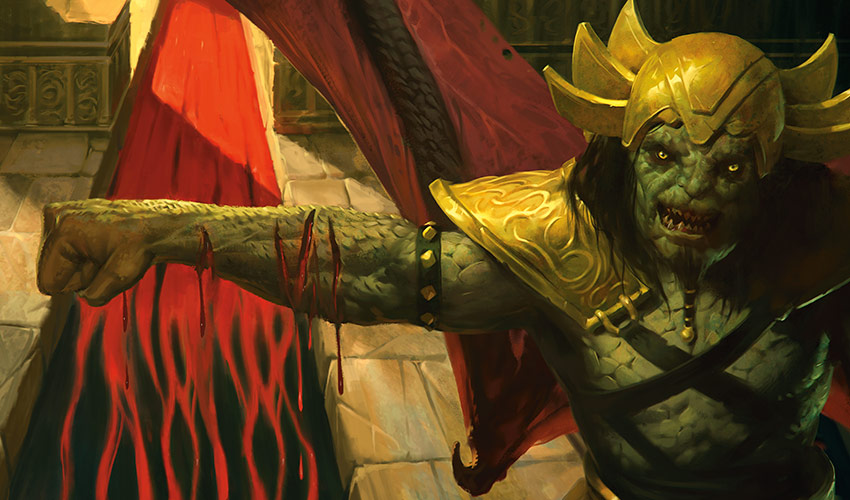
With each drop, the river slowed.
Then its current halted.
Broken reeds sliding downstream came to a sudden and utter stop.
And as the blood began to spread, leak, stain the brown-green-blue of the Luxa River, the brilliant wash of red began to eek upriver.
Shrill screams rang out from the people near the water, growing as many turned to flee, wading out of the river. Djeru watched as the now-stagnant water coalesced into a deep crimson. He felt a strange power pulse from the Luxa in waves.
The demon had turned the river into blood.
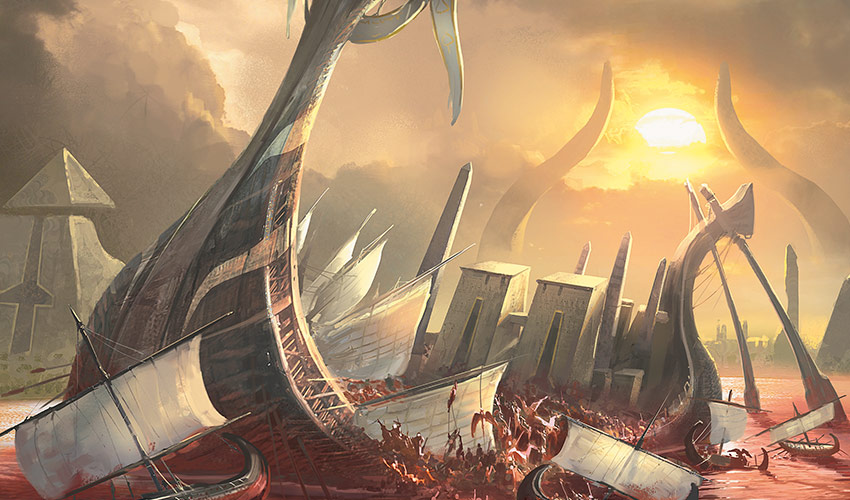
The blood spread, choking reeds and suffocating everything swimming in its depths. Fish began to bob to the surface, mouths gasping and eyes wide. Upriver, dozens of hippopotamuses tried to crawl their way out of the sludge of blood and mud only to drown in the thick mire. An enormous crocodile breached the surface, coughing out red and audibly gasping through the thick liquid. It rolled and gnashed on the bank, its dying body squishing dead fish and eels further into the wine-colored mud beneath it. Everything in the river desperately wanted out. They hastened their deaths as they frantically writhed in the coagulating morass.
Samut grabbed Djeru's arm, a grim expression on her face.
"Do you still believe this is the act of a benevolent God-Pharaoh?"
Djeru shook his head, doubt flooding his mind. As he opened his mouth to answer, an abyssal voice reverberated in the air, booming deep, barbed with malice and filled with horror. On reflex, Djeru clasped his hands over his ears, but it did nothing to shut out the voice of the demon.
"Liliana," it rumbled.
Samut's eyes widened. "Why would the demon know the name of one of the interlopers?" She asked Djeru. He only shook his head in response.
Djeru peered up at the demon and felt the blood in his veins run cold. The demon smiled, razor teeth and fathomless eyes a portrait of power and despair. Its voice boomed out again across the river of blood.
"I know you are here, Liliana Vess. You cannot hide from me."

